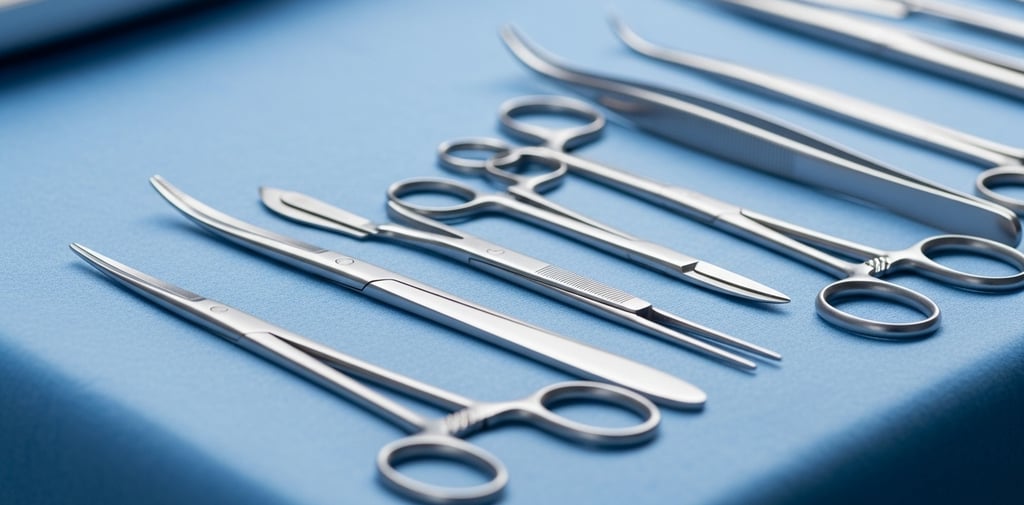Why Stainless Steel is the Gold Standard in Surgical Instruments
Discover why stainless steel is the gold standard in surgical instruments. Learn about its durability, corrosion resistance, sterilization benefits, and why hospitals worldwide trust stainless steel tools.
Prof. Dr. Kirsten Haastert-Talini
8/21/20253 min read


In the world of modern healthcare, precision and reliability are non-negotiable. Surgical instruments are the lifeline of any operating room, and their quality directly impacts patient safety, surgical outcomes, and long-term healthcare costs. Among the different materials used in medical manufacturing, stainless steel has earned its reputation as the gold standard for surgical instruments.
But why exactly is stainless steel the preferred choice of surgeons, hospitals, and manufacturers worldwide? In this article, we’ll explore the science, advantages, and future of stainless steel surgical instruments and why companies like ZestletSurgical continue to prioritize it in every product we manufacture.
The History of Surgical Instruments and Stainless Steel
Surgical tools date back to ancient Egypt and Greece, where instruments were made of bronze, copper, and iron. While these materials served their purpose, they were prone to corrosion, bending, and breaking.
The introduction of stainless steel in the early 20th century revolutionized surgical practice. Stainless steel’s ability to resist corrosion, maintain sharpness, and withstand sterilization made it an instant favorite in medical manufacturing. Over the decades, it became the universal benchmark for surgical instruments.
What Makes Stainless Steel Special?
Stainless steel is not just “regular steel.” It is an alloy of iron with chromium, nickel, and molybdenum, which provides exceptional properties for medical use.
Key Properties:
Corrosion Resistance – Chromium forms a protective oxide layer, preventing rust and degradation.
High Strength and Durability – Instruments retain their shape even under stress.
Biocompatibility – Safe for contact with human tissue and blood.
Sterilization-Friendly – Can withstand autoclaving, heat, and chemical sterilization without damage.
Edge Retention – Surgical blades and scissors stay sharp longer than other materials.
These qualities make stainless steel ideal for both general surgery instruments and specialized surgical sets.
Types of Stainless Steel Used in Surgical Instruments
Not all stainless steels are the same. In surgical instrument manufacturing, three main types are commonly used:
1. Martensitic Stainless Steel
Used for cutting instruments (scalpels, scissors, forceps).
High hardness and excellent sharpness retention.
Example grades: AISI 420, 440.
2. Austenitic Stainless Steel
Used for non-cutting instruments (retractors, clamps, handles).
Corrosion-resistant and tough but less hard.
Example grades: AISI 316, 304.
3. Precipitation-Hardening Stainless Steel
Combines strength and corrosion resistance.
Used for specialized high-performance surgical tools.
Why Stainless Steel is the Gold Standard
1. Superior Corrosion Resistance
Instruments frequently come into contact with blood, saline, and bodily fluids—all of which are corrosive. Stainless steel resists rusting, ensuring long-term reliability.
2. Ease of Sterilization
Hospital-grade sterilization methods (autoclaves, chemical baths, UV disinfection) can damage weaker metals. Stainless steel withstands high heat, pressure, and chemicals without losing its integrity.
3. Durability and Cost-Effectiveness
Although stainless steel instruments may cost more upfront than disposable tools, they last longer and save hospitals money in the long run.
4. Precision and Performance
From delicate neurosurgery to orthopedic procedures, surgeons demand precision. Stainless steel ensures sharp edges, consistent grip, and stable performance in every operation.
5. Global Acceptance
International standards (ISO, CE, FDA) recognize stainless steel as a trusted and approved material for medical use.
Stainless Steel vs. Other Materials
Stainless Steel
Advantages: Durable, corrosion-resistant, affordable, reusable
Disadvantages: Heavier than titanium
Titanium
Advantages: Lightweight, non-magnetic, very strong
Disadvantages: Expensive, harder to sharpen
Ceramics
Advantages: Sharpness retention, biocompatible
Disadvantages: Brittle, limited use cases
Plastic/Polymers
Advantages: Lightweight, disposable, cheap
Disadvantages: Not durable, environmental impact
While alternatives like titanium are growing in popularity for specialized tools, stainless steel remains the best balance of performance, affordability, and reliability.
How ZestletSurgical Ensures Premium Stainless Steel Instruments
At ZestletSurgical, we combine decades of craftsmanship with modern technology to deliver instruments that meet international medical standards.
Our Commitment:
German Stainless Steel: We use high-grade imported steel known for purity and consistency.
Precision Engineering: Every instrument is designed with surgeon comfort and accuracy in mind.
Rigorous Testing: Each product undergoes quality checks for sharpness, corrosion resistance, and durability.
Global Standards: Our instruments comply with ISO 13485, CE, and FDA certifications.
This ensures surgeons worldwide receive instruments that are reliable, safe, and trusted.
Future of Stainless Steel in Surgical Instruments
The medical industry is evolving with robotics, AI, and minimally invasive procedures. Yet stainless steel remains the foundation material for most instruments.
In the future, we may see:
Hybrid instruments combining stainless steel with titanium or polymer handles.
Nanocoatings to enhance corrosion resistance.
Smart instruments with sensors built into stainless steel frameworks.
Even with these innovations, stainless steel will continue to play a central role in surgery.
Conclusion
Stainless steel has rightfully earned its place as the gold standard for surgical instruments. Its durability, precision, and resistance to corrosion make it unmatched in medical applications. For hospitals, surgeons, and distributors, choosing stainless steel instruments is an investment in quality, safety, and long-term value.
At ZestletSurgical, we take pride in manufacturing instruments that meet these high standards—helping medical professionals save lives with confidence.
Call to Action
Are you looking for premium stainless steel surgical instruments for your hospital or medical brand?
👉 Contact ZestletSurgical today for custom manufacturing solutions and bulk orders.
📧 Email: sales@zestletsurgical.com
🌐 Website: www.zestletsurgical.com
Manufacturer & Exporter of
Dental and Surgical Instruments, Beauty Instruments, Diagnostic Devices, Hollowware and Hospital Furniture
Precision
Email:sales@zestletsurgical.com
Phone: +923294372020
© 2025. All rights reserved.
| Corporate
| Commitment
| Sustainability
| Production
| Contact US
Address: Chowk, opp. ZestletSurgical Factory, Kotli Behram, Sialkot, Punjab 51310
